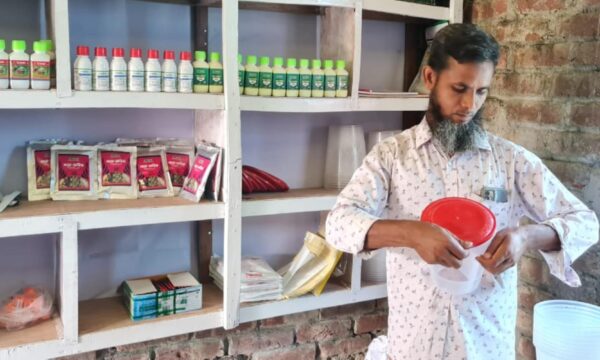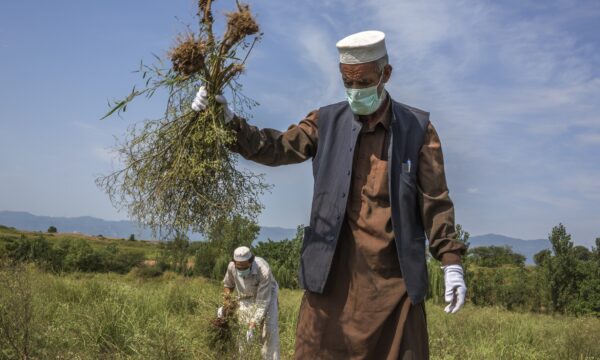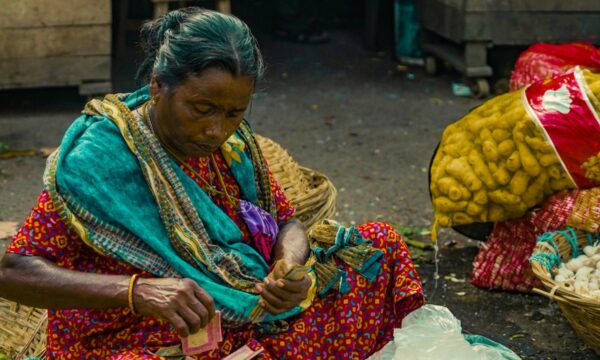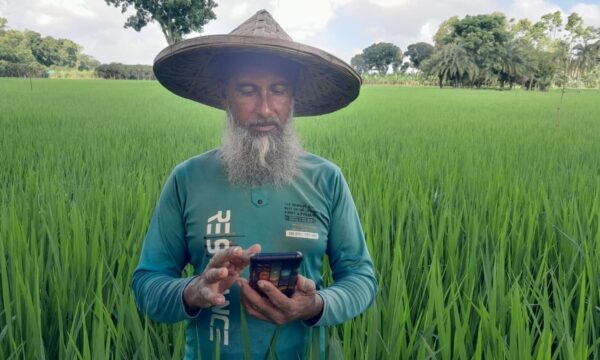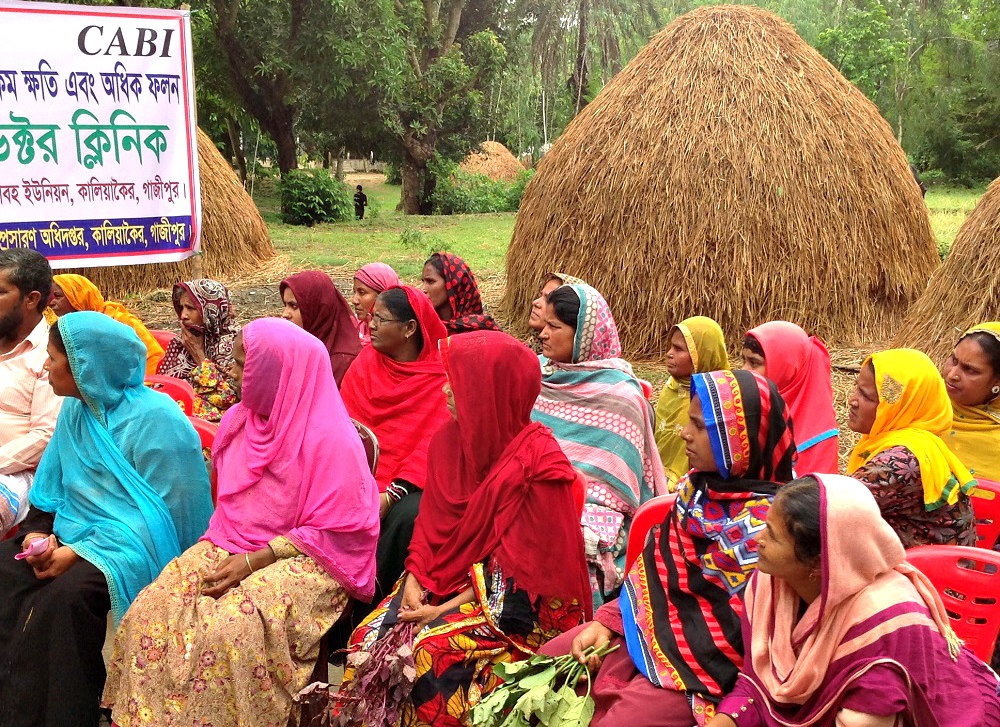
CABI has published three new study briefs exploring how the CABI-led global PlantwisePlus programme supports Bangladesh, Pakistan and Sri Lanka achieve some of their climate and development priorities within agriculture.
PlantwisePlus empowers smallholder farmers to increase their incomes and improve food security and safety, while reducing biodiversity loss through sustainable crop production practices.
The study briefs highlight the pivotal role of development programmes such as PlantwisePlus that act as catalysts for integrating plant health systems into climate adaptation and broader development policies.
These programmes are particularly critical for agriculture-dependent countries, enabling the translation of crop health priorities into actionable strategies that directly empower both men and women smallholder farmers.
Bangladesh is at the forefront of the climate crisis
In respect of Bangladesh, the country is at the forefront of the climate crisis. According to the Global Climate Risk Index 2021, Bangladesh was the seventh most affected country due to climate change impacts between 2000 and 2019.
Owing to its geographic location, fast growing population, environmental and land degradation, high dependency on the agriculture sector, and increasing frequencies and intensities of climate induced shocks and extreme weather events, the country remains highly exposed to climatic and non-climatic stressors.
This undermines livelihoods, ecosystems and socio-economic growth. Agriculture is the backbone of this growing economy, employing at least 45% of the labour force and contributing about 12% towards GDP.
Women account for almost half of the agriculture workforce (BBS, 2022). Currently, 70 percent of the land mass is dedicated to agricultural activities, a sector largely characterized by subsistence production practices and dominated by smallholder male and female farmers (CIAT & World Bank, 2019).
Pakistan topped the list of countries most affected by disasters in 2022
Meanwhile, regarding Pakistan, according to the climate risk index 2024, Pakistan topped the list of countries most affected by disasters in 2022, suffering from devasting floods, landslides and storms (Germanwatch, 2024).
It incurred huge socio-economic losses due to these impacts, and the resource needs to become climate resilient and make the transition to a low-carbon economy by 2030 is approximately USD 348 billion. Tackling the impacts of climate change across all sectors by addressing the underlying vulnerabilities, is a national priority but the country is also severely constrained by resources.
The country is heavily dependent on the agriculture sector, contributing about 24% of GDP and employing almost half of the population, according to the Pakistan Bureau of Statistics.
The sector has one of the lowest productivities for major commodities (such as sugarcane and cotton) when compared globally, and faces multiple other challenges, currently exacerbated by climate change.
Sri Lanka’s agriculture sector forms the backbone of rural livelihoods
Sri Lanka’s agriculture sector forms the backbone of rural livelihoods, food security, and the national economy. Approximately 2.2 million ha, which is equivalent to 35% of the country’s total land area, is used for agricultural purposes. This key sector also employs over 2 million people, or roughly 30% of the workforce.
At the same time, at least 30% of the population also suffers from acute food insecurity. A large extent of this land is owned by smallholder farmers (70% own less than 0.8 ha of land), contributing to a major share of annual crop production. Tea, rubber, coconut with sugarcane, and oil palm plantations can be found mainly in the wet and intermediate zones of the country, making up a significant portion of export income (NDC, 2021).
Sri Lanka, as a tropical island nation, is highly vulnerable to the impacts of climate change. The country’s climate is undergoing three major transformations – a gradual rise in air temperature, shifts in rainfall patterns, and an increase in the frequency and intensity of extreme weather events, including floods, droughts, and strong winds (Menike, & Arachchi, 2016).
Interventions through PlantwisePlus can lead to concrete actions
Srijita Dasgupta, author of the study briefs and Climate Change Expert at CABI, said, “All three countries have identified integrated pest management and climate smart agriculture as priority trajectory to enhancing the sustainability and resilience of the agriculture sector.
“This scoping work highlights how interventions through PlantwisePlus is already leading to concrete actions in support of the national climate and agriculture priorities in Bangladesh, Pakistan and Sri Lanka.
“The studies underscore that the impacts generated by programmes like PlantwisePlus can serve as key levers for deeply integrating plant health systems into climate and development policies.
“However, several barriers continue to impede this integration, including the sustainability of interventions, shifting government priorities that influence budget allocations across departments, limited technical capacities to sustain actions on the ground, and weak institutional collaboration. Moreover, the critical role of extension networks in driving the transition towards low-emission and climate-resilient agriculture remains unacknowledged.
“Realistically, these challenges are likely to persist unless structural reforms and institutional realignments are undertaken, as the current inefficiencies cannot be fully addressed within the existing systems.”
She added that the studies identified clear gaps in understanding of how to align national and local priorities to strengthen climate smart and gender inclusive extension support to smallholders.
“For PlantwisePlus and CABI, this provides a strong avenue and strategic direction to continue working with national and local governments, extension networks, research organizations and farmers to design system wide transformative capacity.
“This will further strengthen plant health systems to tackle the growing challenges of pest and disease problems which are evidenced to be exacerbated by environmental degradation, biodiversity loss and climate change” she said.
Additional information
Main image: A PlantwisePlus plant clinic in Bangladesh (Credit: CABI).
Study briefs
‘Leveraging PlantwisePlus to Support Bangladesh’s Climate and Development Goals: A Scoping Study.’
‘Supporting plant health communities in Pakistan to respond to climate risks in agriculture: A Scoping Study.’‘
Related News & Blogs
In photos: how plant clinics support advisory services in Bangladesh
Over the past decade, CABI has worked in Bangladesh to strengthen national plant health systems, first through Plantwise and since 2021, PlantwisePlus. The programme works with partners to ensure farmers have access to reliable, science-driven crop hea…
24 February 2026

